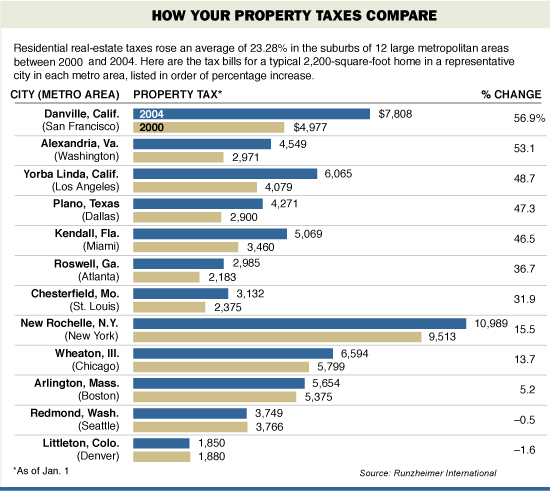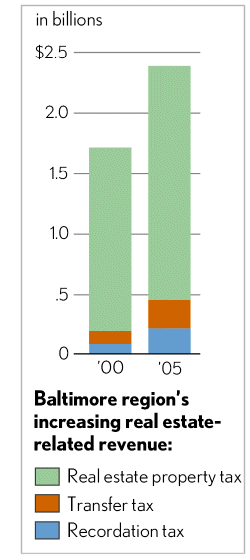

|
| weblog/wEssays archives | home | |
|
Bubbling Property Taxes (April 13, 2006) As noted here and elsewhere, the housing bubble has naturally inflated property taxes across the nation. As this chart shows, the effect is just as strong in "Prop 13" California as it is in locales with no property tax limits. Astute reader Mark D., who lives in San Benito County, south of Silicon Valley, responded to my entry on property taxes (Hidden Costs of the Housing Bubble) with this observation: I think you might underestimate the property tax increase in CA. With all the housing activity in CA, property taxes have increased in my county, San Benito from $16 million in 1990 to $37 million in 2000 and $57 million last year.Mark forwarded the statistics provided him by the San Benito County Treasurer, which show a mind-boggling jump of 54% from just five years ago: 2004-05: $57,690,904.The rise in San Benito is mirrored by similar leaps in other California communities. (According to the Bureau of Labor Statistics, inflation from 2000 to 2005 totaled 13%. Adjusted for inflation, property tax revenues in San Benito County rose by 41%. Don't you wish your income had risen, adjusted for inflation, by 41%?) This chart, topped by a wealthy suburb of San Francisco, supports Mark's contention rather well: 
* * * * * * * * * * * * * * * * * * * * * * * * * * * * * * * While those of us living in high property tax states like New York and California may wish we had the tax bills of those living in Texas and Georgia, the 30% to 50% leaps in property tax bills being handed out to shocked homeowners in such "non-bubble" locales shows the truly frightening scale and national reach of the housing bubble. (Inflation from 2000 to 2004 totaled 10%.) There are several causes behind the rapid rise in California property taxes. One, of course, is the building of new high-priced homes in once-rural, low-property value areas such as the Central Valley and the desert beyond Los Angeles (rather gloriously renamed The Inland Empire by PR-savvy locals some years ago). As the housing boom expanded the creep of sprawl into a sprint, "exurb" communities outside of L.A., San Francisco and Sacramento have seen rapid increases in residents and property taxes. Here's a list of the fastest growing cities in California. Notice that neither Danville nor Yorba Linda made the list, so their rising property values stem from something other than additional units of housing. One cause is clear: the "re-setting" of value when a property changes hands. When an existing home is sold, the assessed value of the property skyrockets to bubblicious heights--and of course, property taxes follow suit. As the number of homes being sold rises, so too does the county's assessed values.  Though there has been some building in Danville, CA over the past five years, it is a pricey
(and therefore growth-wary) suburb; the rise in property taxes comes not from hundreds of
new homes being added to the rolls but by the sales of homes for $1.2 million which had
been on the assessment rolls at $250,000.
Though there has been some building in Danville, CA over the past five years, it is a pricey
(and therefore growth-wary) suburb; the rise in property taxes comes not from hundreds of
new homes being added to the rolls but by the sales of homes for $1.2 million which had
been on the assessment rolls at $250,000.
The real mystery in the chart is what's keeping Colorado and Redmond, WA property taxes so stable, while most regions are experiencing shock-inducing rises. This chart of the Baltimore area's 40+% rise in taxes is more the norm; in my entry of April 6, Derailing the Property Tax Gravy Train, there are links and charts on hotspots of rising property taxes: Texas (represented by Plano in the chart above), Northern Virgina (represented by Alexandria) and Florida (represented by Kendall). The Baltimore graph reveals another interesting consequence of the bubble on local tax revenues: the astounding ascent of transfer taxes. As the bubble deflates and sales plummet, so will the income being derived from the transfers. All of this makes me wonder: what do local governments expect will replace all the vast revenue which will be lost as the bubble deflates? Losses not just in property taxes, but in lower sales tax receipts (all those cabinets, carpets and granite countertops which are no longer being sold) and income taxes (all those impoverished realtors, cabinet salespeople and drywallers with diminishing incomes). Do they hope to raise the taxes somewhere else? How? Who do they think will accept such a heavy burden just as the economy slides into deep recession? More on that another time. For more on the housing bubble and a wide array of other topics, please visit my weblog. copyright © 2006 Charles Hugh Smith. All rights reserved in all media. I would be honored if you linked this wEssay to your site, or printed a copy for your own use. |
||
| weblog/wEssays | home |